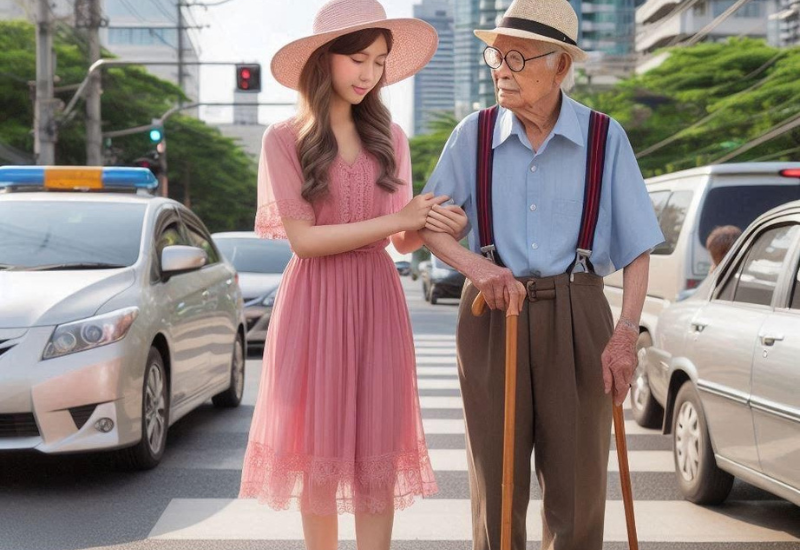Generosity isn’t just about giving money or things. It’s much bigger than that—it’s about sharing kindness, giving your time, and being empathetic toward others. In today’s fast-paced world, people often forget how much of an impact a little generosity can have on others and even on themselves. When you give to others without expecting anything in return, it boosts your personal growth and helps create a better society.
Generosity can make your life more fulfilling while also bringing positive changes to the world around you. Let’s explore simple ways to practice generosity, illustrating its impact through a real-life case study.
What is Generosity?
Generosity means giving freely, without expecting anything in return. It’s not only about giving material things; it can also be giving your time, attention, or support to someone who needs it. Generosity can show up in different ways:
- Emotional Generosity: Listening to someone when they’re going through a tough time.
- Material Generosity: Donating clothes or money to those in need.
- Intellectual Generosity: Sharing your knowledge to help others grow.
Each of these forms of generosity is important, and you can choose the one that fits best in your life.
Why is Generosity Important?

Personal Benefits:
Being generous can do wonders for you personally. When you give to others, you feel good about yourself, which can lower your stress levels. It also gives you a sense of purpose, making life feel more meaningful. Plus, when you’re generous, people are more likely to trust and respect you, which strengthens your relationships. For example, if you regularly help a neighbor by walking their dog or offering advice, you may find that your bond with them grows stronger.
Social Impact:
Generosity doesn’t just help you; it helps the whole community. When you’re kind and giving, it inspires others to do the same. Think of it like a ripple in water. One small act of kindness can spread far, touching the lives of many people. For instance, donating to a local charity can help feed a family in need, which, in turn, can lead them to one day help someone else. Communities that are built on generosity are stronger, kinder, and more supportive of each other.
How to Be More Generous

Generosity can be as simple as doing small acts of kindness every day. It’s about more than giving money—your time, attention, and emotional support are all valuable. Let’s explore some easy and practical ways to be more generous in your daily life.
1. Start Small
You don’t need to make big, expensive gestures to be generous. The key is to start with small actions that are easy to include in your everyday routine. For example, if you see someone struggling with heavy bags at the grocery store, offer to help carry them. When you’re on the bus and notice someone who’s tired or elderly, give up your seat. Even a kind compliment, like telling someone they did a great job on a project, can make their day.
These small acts may seem insignificant, but they leave a lasting impact on the people around you. They also help you develop a habit of being kind, which can grow into bigger acts of generosity over time.
Real-life example: Imagine you’re in a coffee shop, and the person in front of you realizes they forgot their wallet. You could offer to cover their coffee, which is a simple act, but it would likely make their day much better. They may even pay it forward and help someone else down the line.
2. Listen and Observe
To be more generous, it’s important to pay attention to the people around you. Often, people don’t directly ask for help, but if you look closely, you’ll notice when someone is in need. Maybe a coworker looks stressed because they’re juggling too many tasks, or a friend is unusually quiet because they’re going through a hard time.
By listening and observing, you can find ways to step in and offer help. It could be as simple as asking, “Do you need a hand with that?” or offering advice when a friend seems lost. These small, thoughtful actions show that you care and that you’re ready to offer your support.
Real-life example: Sarah noticed her friend Lisa was very quiet at lunch one day. Instead of ignoring it, Sarah asked, “Is everything okay?” Lisa opened up about feeling overwhelmed with work. Sarah didn’t solve the problem but offered her support by listening and offering a few kind words. That act of noticing and caring made Lisa feel less alone.
3. Give Your Time
Time is one of the most precious gifts you can give to someone. Volunteering is a great way to show generosity, whether it’s helping at a local shelter, coaching a kids’ sports team, or spending time with elderly neighbors who may feel lonely. Sometimes, just being there for someone can be more valuable than any material gift.
You don’t need to spend all your free time doing volunteer work. Start small—maybe an hour a week helping out at a local charity or simply offering to babysit for a friend who needs a break. Giving your time shows that you value the people around you, and it often creates deeper connections.
Real-life example: John, a busy college student, spent an hour every Saturday volunteering at an animal shelter. He loved animals, and even though his schedule was full, he knew that small amount of time made a difference for the shelter and the animals. It didn’t take much effort, but it was a meaningful way for him to give back.
4. Practice Emotional Generosity
Sometimes, people don’t need material things; they just need someone to be there for them emotionally. Emotional generosity is all about giving your support, care, and understanding to others. If a friend is feeling down, offer to listen to them without judgment. If a family member is stressed, encourage them and let them know that you’re there to help in any way you can.
Being emotionally generous helps build strong, deep relationships. It creates trust and shows that you’re a reliable and caring person, which people will value more than any physical gift.
Real-life example: Emma’s friend, Mark, was going through a rough time after losing his job. While Emma couldn’t fix the situation, she checked in with him regularly, sent him encouraging messages, and listened when he needed to vent. Mark said that Emma’s emotional support helped him stay positive and hopeful during that tough period.
5. Donate Wisely
Donating money is another form of generosity, but it’s important to donate wisely. If you have extra money to give, consider supporting causes that align with your values. Do some research to ensure that the organizations you donate to are using their funds in ways that truly help the cause. That way, your donation has a real, lasting impact.
However, if you don’t have much to give, don’t worry! You can still donate other things, like clothes, books, or even your time. Every bit counts, and even small donations can make a big difference.
Real-life example: Tom regularly donated to a local food bank, but he also made sure to research the organization to see how they were using the donations. He felt confident knowing that his money was being used to feed families in need in his community, making him feel connected to the people he was helping.
6. Be Grateful
Practicing gratitude can actually inspire more generosity. When you take a moment to appreciate the good things in your life, you’ll feel more inclined to share your blessings with others. Gratitude makes you realize that you have enough to give, whether it’s your time, money, or simply a kind word.
Being grateful also helps you see opportunities for generosity that you may have overlooked before. By reflecting on your own life, you’ll naturally want to spread that positivity to others.
Real-life example: Kate kept a gratitude journal where she wrote down three things she was thankful for every day. One day, she realized how much she had gained from the support of her friends and family. Inspired by her gratitude, she decided to volunteer at a local community center to help others who didn’t have the same support system.
7. Teach and Share Knowledge
One of the most valuable ways to be generous is to share your knowledge or skills with others. If you’re good at something—whether it’s fixing cars, cooking, or even using a computer—you can offer to teach someone who could benefit from that skill. You don’t have to be an expert; even sharing the basics can help someone get started.
This type of generosity is powerful because it doesn’t just give someone a temporary solution; it equips them with tools they can use for a lifetime.
Real-life example: Paul noticed that his coworker was struggling with Excel spreadsheets at work, so he offered to show her a few tips. It only took about 30 minutes, but his coworker felt much more confident afterward and was grateful for the help. This small act of sharing knowledge not only made her job easier but also strengthened their work relationship.
Case Study: The Impact of Generosity

Meet Jane, a teacher at a local school. Jane wasn’t rich, and her schedule was always packed with work, but she believed in the power of small acts of kindness. Every day, she practiced generosity in simple ways—whether it was buying lunch for a student who forgot their lunch money or staying after school to tutor struggling kids.
One day, she noticed that one of her students, Amy, had been unusually quiet and withdrawn. After class, Jane gently asked if everything was okay. Amy shared that her family was going through a tough time financially, and she was feeling embarrassed. Jane listened attentively, offering Amy a safe space to talk. She then started bringing extra snacks to school, making sure Amy always had something to eat without making her feel uncomfortable.
Jane’s consistent generosity didn’t just help Amy—it inspired others, too. Her fellow teachers noticed what she was doing and began helping out in their own ways, creating a more supportive environment at the school. The students saw how caring their teachers were and started looking out for one another as well. This ripple effect turned small acts of kindness into a culture of generosity within the school community, showing that even small actions can have a big impact.
Final Thoughts
Practicing generosity can bring countless benefits to your life and the lives of others. It’s not something that has to be done on a large scale or in grand gestures. Even the smallest acts of kindness can make a huge impact. By starting small, being mindful of others’ needs, and sharing what you have, you can make generosity a regular part of your daily routine. And once you make it a habit, you’ll see just how much it improves not only your life but also the world around you.
Take a moment today to think of one small way you can be generous—whether it’s offering a compliment, helping a friend, or donating to a cause you care about. Start small, and see how these acts of kindness can make a big difference in your life and the lives of those around you. Let’s spread generosity, one small step at a time!
Can someone still be generous if they don’t have much money?
Absolutely! Generosity isn’t just about giving money. People can be generous with their time, attention, or skills. Small actions like helping a friend, offering kind words, or being a good listener are all forms of generosity that don’t cost a thing.
How can a person practice generosity if they have a busy schedule?
Even in a busy schedule, it’s possible to practice generosity. It doesn’t require a lot of time. Simple gestures like helping a coworker with a task, giving a compliment, or checking in on a friend can be done in moments. Generosity can easily fit into everyday routines.
Why should someone give to others when they have their own problems to deal with?
Giving to others can actually help people feel better, even when they’re dealing with their own challenges. Studies have shown that practicing generosity can reduce stress, boost mood, and create a sense of purpose. Helping others can also provide perspective and a greater sense of connection.
How can someone be sure that their donations are being used effectively?
It’s a good idea to do some research before donating. People can look for organizations that are transparent about how they use their funds and check reviews or ratings from charity watchdogs. This way, they can ensure their donation is making a real difference.
Can small acts of generosity really make a difference?
Yes, small acts of generosity can create a powerful ripple effect. When one person shows kindness, it often inspires others to do the same. Over time, these small actions contribute to building a more caring and connected community, making a lasting impact.
